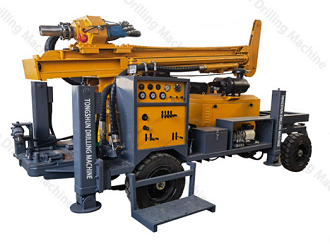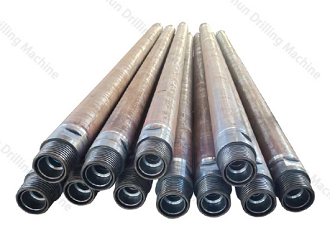Securing a reliable water supply for your home or agricultural needs hinges on understanding water well casing pipes. These pipes do more than aid the drilling process; they protect your water source from contamination, ensuring it remains pure and sustainable. In this blog, we'll explore the vital role that well casing plays in safeguarding groundwater, supporting well structure, and promoting efficient water flow.
Water well casing is a pipe that lines the drilled hole of a water well, typically made of steel or PVC. It serves as the primary structural component, ensuring stability, preventing the collapse of the well walls, and protecting against external contaminants. Installed during the drilling process, the casing extends from the ground surface to the bottom of the well, designed to withstand high pressure and provide a sealed pathway for water to flow to the surface.
Water well casing pipes are tubular structures that line a drilled well to support it and keep contaminants out. They are installed during drilling and extend from the surface to the bottom of the well.
A water well casing pipe is a rigid pipe installed inside a drilled well hole to prevent soil and rock from collapsing into the well shaft, protecting the water supply and providing a sealed pathway for clean water extraction; it's typically made from materials like PVC, steel, or fiberglass, with each offering different benefits depending on the soil conditions and depth of the well.
Selecting the right water well casing pipe is essential, as it significantly affects the longevity and safety of your water supply. A suitable casing acts as a robust barrier, protecting your water from contamination and ensuring the structural integrity of your well.
The material of the casing pipe plays a crucial role in its resistance to environmental stressors and overall lifespan. Opting for a durable material minimizes maintenance and replacement costs.
Soils vary in acidity and chemical properties, which can impact the casing’s integrity. It's vital to choose a material that can withstand these specific conditions.
Compliance with local and national standards is essential. The right casing ensures your well meets all regulatory requirements, helping to avoid legal issues and ensuring the safety of your water supply.
Water well casings come in various materials, each with its own benefits and ideal applications. The most common types include PVC, steel and fibreglass. PVC is lightweight, resistant to corrosion and cost-effective, making it a popular choice for many. Steel, known for its strength and durability, is suited for deeper wells where structural integrity is paramount. Fibreglass, though less common, offers a corrosion-resistant alternative with a blend of strength and flexibility.
Choosing the right water well casing involves several factors tailored to your specific project requirements. Here are key considerations:
Deeper wells necessitate stronger materials capable of withstanding increased pressure.
Corrosive or abrasive soils can affect material selection. We offer casings designed to suit softer ground conditions.
The presence of certain minerals or chemicals in the water can determine the most suitable casing material to prevent contamination.
A well-constructed water well casing is essential for preserving water purity, as it isolates the water column from potential contaminants, ensuring safe consumption.
An appropriately installed casing acts as a barrier against pollutants, safeguarding the water supply.
The casing provides vital support for the well’s walls, preventing collapses that could compromise water quality.
Let’s compare the key properties of PVC, steel and fibreglass:
Property | PVC | Steel | Fibreglass |
Strength | Low resistance to collapse, limited use in deep wells | High resistance to collapse, suitable for deep wells | Equivalent to steel for its weight, suitable for deep wells |
Corrosion | No corrosion, smooth interior surface discourages bacterial growth | Corrosion over time due to galvanic reactions, rust and iron bacteria, the roughened surface provides a home for bacterial growth | No corrosion, smooth interior surface discourages bacterial growth |
Installation | Easier installation, less labour required | More difficult installation, more labour required | Similar to PVC, less is labour required |
Cost | Less expensive | More expensive | Similar to PVC, it’s less expensive |
Temperature | Susceptible to extreme temperatures | Resistant to extreme temperatures | Resistant to extreme temperatures |
UV exposure | Degrades in sunlight unless a protective coating is used | No degradation in sunlight | No degradation in sunlight |
Understanding the importance of water well casing pipes is crucial to securing a safe and reliable water supply. With the right knowledge and considerations, you can ensure your water well is built to last, providing clean, safe water for years to come.
How often should I inspect my well casing?
It's recommended to have a professional inspect your well casing at least once a year, especially if you notice changes in water quality or pressure.
What signs indicate a damaged well casing?
Signs include discolored water, low water pressure, leaks around the well head, or visible cracks on the exposed casing.
Can I repair a section of my well casing?
Depending on the damage, partial repairs may be possible, but a full replacement might be necessary in severe cases.
What is the difference between well casing and well screen?
The casing is the main pipe that lines the well, while the well screen is a perforated section installed at the bottom of the casing to filter out sediment while allowing water to flow in.


Copyright © Jinzhou City TongShun Drilling Machine Co.,Ltd. All Rights Reserved Sitemap | Powered by 